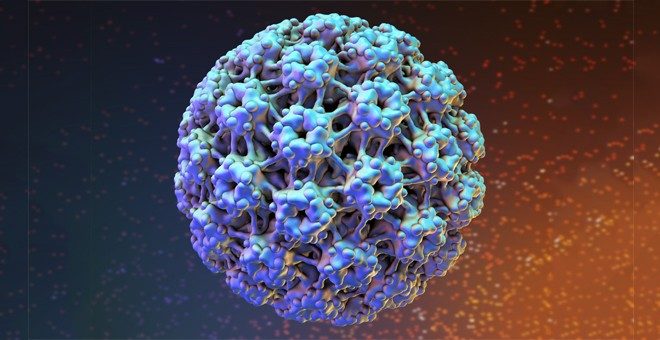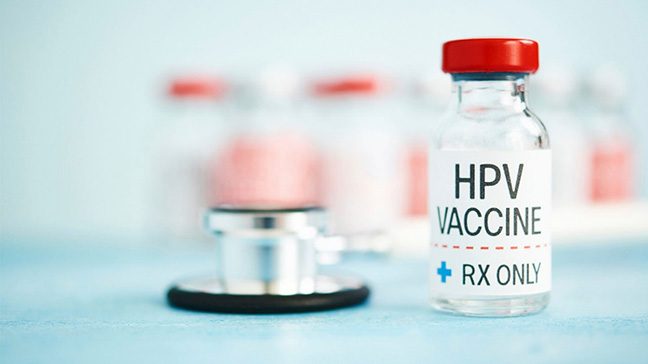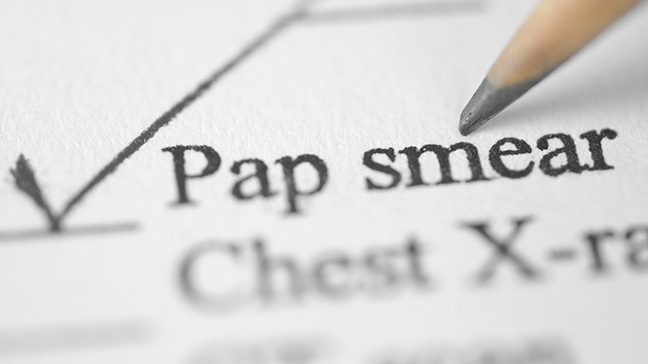Help your kids prevent cancer
Human Papillomavirus (HPV)
What is HPV?
HPV is a virus that is spread by intimate skin-to-skin contact. While most cases are sexually transmitted, people who haven’t had intercourse can become infected. There are more than 150 types of the HPV virus. Several types cause genital warts. There are about 12 types – known as high-risk types -- that cause HPV-related cancer.
About 80% of people – both men and women – will get an HPV infection at some point in their lives. Most people with HPV don’t know they’re infected and never develop symptoms. The body most often clears the virus before it causes any health problems. But for some, the infection persists and can lead to precancerous changes.
HPV screening, including FDA-approved self-collection tests for HPV, can determine if a woman has a cervical HPV infection. There is no approved screening exam to detect HPV infections in other parts of the body in men or women. There is no drug or treatment that can eliminate the HPV virus from the body. However, there are ways to treat HPV-related health problems like precancerous lesions and genital warts.
HPV and cervical cancer
Almost all cervical cancers are caused by HPV. Because no vaccine prevents all types of HPV that can cause cervical cancer, vaccinated women age 21 to 29 should get cervical cancer screening (Pap tests) every three years.
Beginning at age 30 and through age 64, women should get a Pap test and and HPV test every five years. The HPV test checks your cervix for the virus, which can cause abnormal cells that lead to cervical cancer. If the test is positive, you may need more frequent screening for cervical cancer.
HPV and throat cancer
Throat cancer is the most common HPV-related cancer in men. Throat cancer is also referred to as oropharyngeal cancer. It forms in the tonsils and around the base of the tongue. Women can also get this type of cancer from HPV infection.
About 75% of throat cancers are the result of HPV infections. There is no screening exam for throat cancer.
HPV vaccine
The HPV vaccine prevents most cervical cancers, anal cancers, vaginal cancers, and vulvar cancers. It reduces the risk of most HPV-related cancers of the throat and the penis, and it also prevents HPV-related genital warts in both men and women.
The HPV vaccine is given in two doses for males and females ages 9-14. From ages 15-45, three doses are required for full immunity. It is most effective when given at ages 11–12.
All males and females ages 9–26 should get the human papillomavirus vaccine. It is a safe and effective method of protection against HPV infection.
Unvaccinated men and women ages 27–45 should talk to their doctor about why it is beneficial.

HPV tests with self-collection: What to know
This month, the Food and Drug Administration (FDA) approved self-collection to test for HPV, the virus that causes cervical cancer. As a researcher who has spent my career studying how to make cancer screening more accessible, especially for underserved populations, I am unbelievably excited.
HPV, or the human papillomavirus, is a group of more than 100 viruses that can be passed from person to person. It is very common; most humans will more than likely have HPV at some point in our lives. Most of us will clear HPV infections on our own through our body's natural immunity. However, some of us will have persistent infections that can lead to changes in our cells. The persistence of certain more aggressive types of the virus can put some of us at higher risk for cervical cancer and other HPV-associated cancers.
Cervical cancer and other HPV-associated cancers can be prevented by getting the HPV vaccine early in life. Additionally, cervical cancer can be prevented through screening, which allows precancerous changes in the cervix to be found and treated early, before they become cancer. In the United States, screening is usually performed by women’s health professionals using Pap and HPV tests. But now, newly approved self-collection methods are making it possible for women and people with a cervix to take their own samples in a broad range of health care settings, including primary care and mobile health clinics. This offers an unprecedented opportunity to expand access and provide women with a more widely acceptable option for staying up to date with regular screening.
Here, I share more about how self-collection is performed, who is eligible and what to know about the future of HPV screening.
How do HPV tests with self-collection work?
HPV tests work by detecting high-risk strains of the virus that may be present in cells in the cervix or the vagina. Samples for HPV testing are usually collected during a pelvic exam.
Now, there are a couple of devices and tests that were approved by the FDA for self-collection. One device is a swab that looks like a large Q-tip. Another looks similar to a tampon. Both are inserted into the vagina and rotated a couple of times to take a sample. The sample is then sent to a lab for HPV testing with an approved test.
Self-collection is currently approved for use in health care settings. While there is still a lot of work to implement self-collection, the vision is that self-collection kits will be available in health care settings where women can go to a restroom on site to collect a sample.
If the test comes back positive, it is very important that the patient get additional tests to see if the virus has caused any changes in the cervix that might progress to cancer. This usually means receiving a Pap test or a diagnostic test called a colposcopy.
Who is eligible for HPV test self-collection?
Right now, the FDA has approved self-collection as an alternative way to collect samples for HPV testing in situations where a pelvic exam isn’t recommended or otherwise possible.
Self-collection may be used in situations in which a pelvic exam is not a good option due to lack of access, which is a significant barrier to cervical cancer screening. Many people don’t have access to traditional cervical cancer screening tests for a variety of reasons. These reasons might include:
- Not having insurance
- Living in a medically underserved area
- Lacking the time, transportation or childcare needed for an appointment
Self-collection may also be used in situations in which a pelvic exam is not an acceptable option for a patient. Some reasons a pelvic exam might not be possible for a patient include:
- Past trauma
- Not identifying as women (such as in the case of transgender men)
- Religious and cultural beliefs
- Discomfort and anxiety
In my research, we’ve found that under-screened people visit their health care settings for primary or emergency care, but not specifically for screenings with a women's health professional. For these populations, self-collection will allow them to be screened while they address other health care needs. Being able to self-collect while waiting to see a provider for another health issue allows them to do screening tests that would otherwise require an entirely different appointment with a more specialized provider like a gynecologist.
While self-collection is currently indicated in situations when a pelvic exam can’t be performed, I think self-collection will be used a lot more broadly in the future. I think many women will be in favor of having the ability to perform screening themselves.
Are self-collection results as accurate as the results a health care provider gets?
Yes. Self-collection has been implemented very widely internationally. Hundreds of thousands of women across the globe have participated in self-collection studies, both as research and as full-blown implementation programs. For example, in many northern European countries, self-collection is standard of care and available to everyone.
We know from data from all around the globe that the accuracy of the tests is identical.
Who needs HPV screening?
HPV testing is available for women ages 25 and older. Here are the cervical cancer screening exams MD Anderson recommends women get based on their age.
Women ages 21 to 29:
- A Pap test every three years beginning at 21, or
- An HPV test every 5 years beginning at 25
Women ages 30 to 64:
- An HPV test alongside an optional Pap test every 5 years, or
- A Pap test every 3 years
Women ages 65 and older:
- Screening can be discontinued as long as previous screening tests have been negative. Make this decision with your care team.
While screening and early treatment can prevent cervical cancer, there are no widespread screening tests for the other HPV-associated cancers, such as oropharyngeal (throat) cancer and anal cancer. This makes HPV vaccination critical for preventive HPV-associated cancers.
Kids and teens should get the HPV vaccine starting at age 9 to protect against six HPV-associated cancers. Catch-up vaccination can be done through age 26, and adults ages 27 to 45 can speak with their doctor about possibly getting vaccinated.
Is there anything else people should know about the future of HPV testing?
Here are a few more things to know about the future of HPV testing.
At-home self-collection could be approved in the future
Primary HPV testing with self-collection is approved for use in health care settings now. However, there are ongoing trials that will provide the FDA with data that could lead to the approval of at-home self-collection.
In the meantime, clinic-based self-collection is a huge step forward. It will enable more people to access screening and cervical disease management.
Cervical cancer screening is a process, not a test
It is crucial that anyone who tests positive for HPV has easy access to follow-up care to help manage HPV and the risk of cervical cancer.
We have the opportunity to eliminate cervical cancer
We have a very effective vaccine against HPV. Now, we have screening tools that expand access to screening and management of cervical disease. Cervical cancer elimination is within our reach and can help achieve MD Anderson’s goal of Making Cancer History®.
Request an appointment at MD Anderson online or call 1-877-632-6789.

I have HPV. Now what?
We all hope the awkwardness is over after we get our Pap and HPV tests. So hearing that you have tested positive for HPV can be a blow. What happens next?
Well, for one, you’re not alone.
“More than 80% of people will be infected at some point in their lifetime,” says gynecologic oncologist Lois Ramondetta, M.D.
The good news is that, in most cases, your immune system clears the virus before any health problems develop. The risk for cancer increases if your body cannot fight off the virus for some reason, and it stays in your system.
Ahead, Ramondetta shares more information on HPV and what to know if you have it.
What is HPV?
HPV stands for human papillomavirus. There are more than 100 strains of the virus.
The virus lives on your skin and is spread during intimate contact, Ramondetta says. This includes:
- Intercourse
- Oral sex
- Genital contact
Most strains of HPV do not cause cancer – or any symptoms at all. However, in cases where HPV does have symptoms, they might include:
Genital warts
Some HPV strains cause genital papillomas, or warts, in both men and women. These warts will usually show up a few months after you are exposed to HPV. They can be treated with prescription medication or removed. The Centers for Disease Control and Prevention (CDC) writes that genital warts may disappear on their own, stay the same or grow in size or number.
Certain cancers
Other strains of HPV are known to be high-risk and can cause cancer. HPV 16 and HPV 18 are two strains commonly linked to cancer, but there are also a handful of other high-risk subtypes, Ramondetta says.
In women, these strains can cause:
In men, high-risk strains of HPV can cause:
Other health issues
Ramondetta says HPV can cause other health issues, including:
- Pre-cancers of the vulva and cervix
- Respiratory papillomatosis, or papillomas on the voice box
- Papillomas in young children. In rare cases, HPV can be passed from a mother to her child as they exit the birth canal.
How is HPV diagnosed?
HPV usually doesn’t have any symptoms, so it can be hard to tell you have it, Ramondetta says. For this reason, she says everyone should assume they will be exposed to HPV at some point in their lives, with most being exposed in their 20s.
HPV is diagnosed through an HPV test. Currently, only women can be screened for HPV. This screening is usually done at a doctor’s office at the same time as a Pap test. Your practitioner will use a soft brush to take a sample of cells from your cervix. This sample will be sent to a lab for testing.
Here’s how often MD Anderson recommends women at average risk for cervical cancer should get HPV tests.
Women ages 21 to 29
Women ages 21 to 29 should get a Pap test every three years. Women who choose not to get Pap tests should begin HPV tests every five years beginning at age 25.
Women ages 30 to 64
MD Anderson recommends women 30 and over get a Pap and HPV test every five years.
Women over age 65
Some women may be able to stop screening at 65 depending on their medical history. Women should speak with their gynecologist to decide how to proceed.
What’s my cancer risk if I have HPV?
If you get a positive HPV test, your physician has detected one or more high risk strains of the virus.
Our experts say the most important thing to know if you have HPV is that the risk of cancer is very small but should be taken seriously.
“Don’t panic, and don’t ignore it,” Ramondetta says. “Make sure you follow up with your doctor on the next steps and try to keep things in perspective. If you have HPV, there’s a very good chance it won’t be a long-term problem for you.”
Your immune system will attack the virus, and it will likely be gone within two years. Of the millions of cases of HPV diagnosed every year, only a small number become cancer. Most of those cases are cervical cancer; almost all cervical cancer cases are caused by the HPV virus.
The HPV vaccine can help the body recognize and eliminate the virus more effectively, Ramondetta says.
“The vaccine is so effective because it essentially gives your immune system the ‘cheat sheet’ for recognizing the virus,” she says.
Other HPV-related cancers are rare. Routine screening is not recommended or available at this time.
While dentists are starting to check for oropharyngeal (throat) cancer, they are not able to test for HPV. Additionally, because oropharyngeal cancer forms deep in the throat, it is more challenging to detect early. It is often found after a lump develops.
Making healthy lifestyle choices can give your body the best chance of clearing the virus.
“Choosing healthy foods filled with antioxidants, staying active, lowering your stress levels and avoiding tobacco are all ways to keep your immune system strong,” Ramondetta says.
Do I need additional HPV testing?
The results of your Pap and HPV test are used to determine if you need additional testing.
Positive HPV test, normal pap
If you test positive for HPV and your Pap test is normal, your doctor will most likely recommend repeating the Pap and HPV screening exams in one year.
If your second HPV test comes back negative, continue regular Pap and HPV tests.
If your second HPV test comes back positive, your doctor may recommend a colposcopy.
During a colposcopy, your doctor will look more closely at the cervix, vagina or vulva with a special microscope called a colposcope. The doctor is looking for abnormal cells or blood vessels, which may require further treatment.
Positive HPV test, abnormal pap
If you test positive for HPV and your Pap test was abnormal, your doctor will probably follow up with a colposcopy. Try to see a physician who specializes in this procedure.
Talking to your partner about HPV
With any medical problem, it's natural to wonder: “How did this happen?” With HPV, it can be very difficult to pinpoint when you were exposed. It's possible that the virus was in your system for a long time before it was detected. People often never know they have caught it or passed it on.
“HPV could’ve been there for years before it shows up, if it ever does,” Ramondetta says.
When talking to your partner about your diagnosis, remember 80% of people will have HPV at some point in their life.
Your partner can catch it from you. However, they have probably already been exposed by you or someone else.
If your partner is a woman, she should be sure to follow screening guidelines described above in order to keep up with her own Pap and HPV testing so if a problem does develop, it is found early.
Protect yourself from HPV
Because HPV lives on your skin, condoms don’t fully protect you from it.
The best way to protect yourself from HPV-related cancers is to get the HPV vaccine.
Ramondetta says that getting the HPV vaccine after being infected doesn’t make the infection go away. However, getting the vaccine before you're exposed to HPV can prevent against 7 high risk subtypes and 2 low risk subtypes.
All males and females should get the HPV vaccine. Ideally, to be best protected, children should be vaccinated between 9-14 years of age; the earlier, the better. Unvaccinated adults ages 27–45 should talk to their doctor about the benefits of the vaccine.
If you get your first dose of the HPV vaccine between ages 9 and 14, only two doses are required. Those who get their first dose of the vaccine after age 15 will need three doses for full immunity.
You can’t get HPV from the HPV vaccine, which is safe and has no serious side effects, Ramondetta says.
“The vaccine has been proven again and again to be safe and effective and long lasting," she says. “It is something I didn’t hesitate to give my children. I try to encourage every parent to get their 9- or 10-year-olds the first shot so they only need two total for decades of protection.”
Request an appointment at MD Anderson online or call 1-877-632-6789.
Featured Articles
request an appointment online.
Help #EndCancer
Give Now
Donate Blood
Our patients depend on blood and platelet donations.
Shop MD Anderson
Show your support for our mission through branded merchandise.


